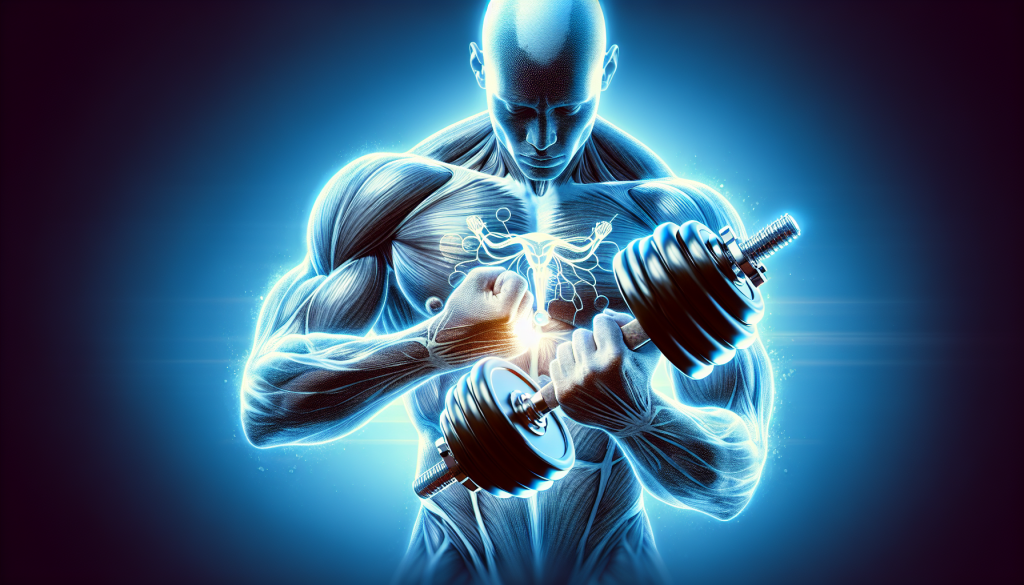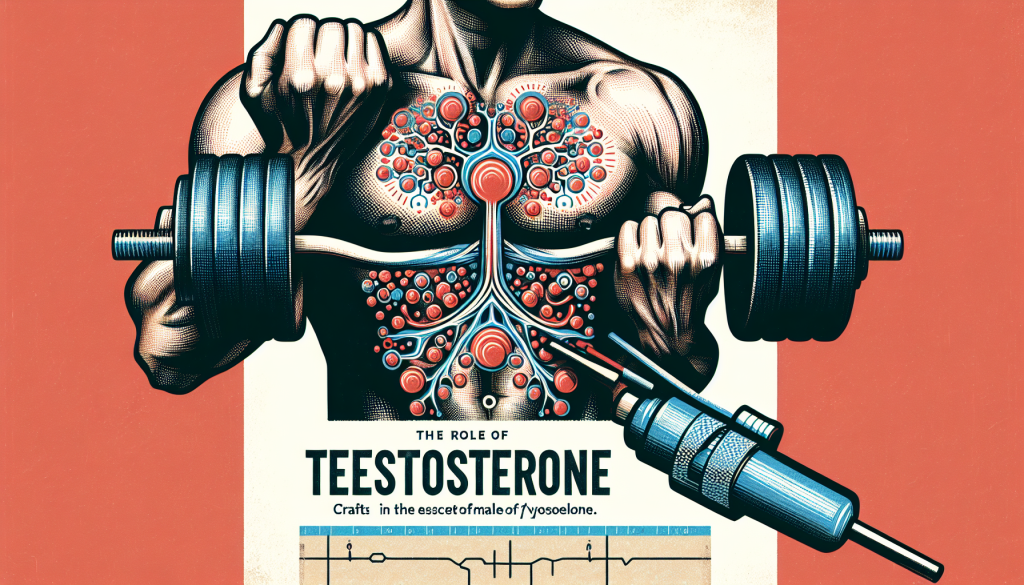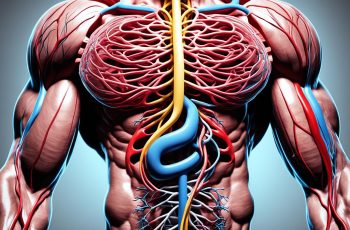Ad Blocker Detected
Our website is made possible by displaying online advertisements to our visitors. Please consider supporting us by disabling your ad blocker.
Have you ever wondered what exactly testosterone does for a man? It turns out that this hormone plays a crucial role in male physiology, affecting everything from muscle and bone strength to mood and libido. Testosterone is responsible for the development and maintenance of male characteristics, such as facial hair and deepening of the voice during puberty. Beyond physical attributes, this hormone also contributes to a man’s overall well-being and mental health. In this article, we will explore the various functions of testosterone in male physiology, shedding light on its importance and impact on a man’s everyday life. So, let’s dive into the fascinating world of testosterone and discover how it shapes men’s bodies and minds.

This image is property of images.unsplash.com.
Overview of Testosterone
Definition of testosterone
Testosterone is a hormone that plays a crucial role in male physiology. It belongs to a class of hormones called androgens, which are responsible for the development and maintenance of male characteristics.
Our body’s primary male sex hormone
Testosterone is often referred to as the primary male sex hormone. Although women also have testosterone, it is present in much smaller quantities. In men, testosterone is mainly produced in the testes, but a small amount is also produced in the adrenal glands.
Production and regulation of testosterone
The production of testosterone is regulated by a complex system involving the hypothalamus, pituitary gland, and testes. The hypothalamus releases a hormone called gonadotropin-releasing hormone (GnRH), which signals the pituitary gland to produce luteinizing hormone (LH) and follicle-stimulating hormone (FSH). LH then stimulates the testes to produce testosterone.
Development and Sexual Characteristics
Role of testosterone in fetal development
Testosterone plays a critical role in fetal development, particularly in the formation of male genitalia. During gestation, testosterone levels rise, leading to the differentiation of the male reproductive organs. It is responsible for the development of the penis, scrotum, and prostate gland.
Puberty and testosterone
The onset of puberty brings significant changes to the male body, and testosterone plays a crucial role in this process. As boys reach puberty, their testosterone levels increase, leading to the development of secondary sexual characteristics. These changes include deepening of the voice, growth of facial and body hair, and broadening of the shoulders.
Facial and body hair growth
One of the noticeable effects of testosterone is the growth of facial and body hair. Testosterone stimulates the hair follicles to produce thicker, coarser hair. It is responsible for the growth of a beard, chest hair, leg hair, and underarm hair. The amount and distribution of hair growth can vary from person to person, depending on genetics and individual hormone levels.

This image is property of images.unsplash.com.
Muscle Mass and Strength
Testosterone’s influence on muscle growth
Testosterone plays a significant role in muscle growth and development. It promotes protein synthesis, which is essential for building and repairing muscle tissue. When testosterone levels are optimal, it enhances the production of muscle proteins and increases muscle size and strength.
Effect on muscle mass and strength
Higher levels of testosterone are often associated with increased muscle mass and strength. Testosterone stimulates the growth of muscle fibers and can improve muscle performance during physical activities and exercise. Adequate testosterone levels contribute to greater endurance, faster recovery, and improved overall athletic performance.
Relationship between testosterone and exercise
Regular exercise has shown to have a positive impact on testosterone levels. Engaging in strength training exercises, such as weightlifting and resistance training, can lead to an increase in testosterone production. Additionally, maintaining a healthy lifestyle, with regular physical activity and a balanced diet, can help promote optimal testosterone levels for muscle growth and overall health.
Bone Density
Importance of testosterone for bone health
Testosterone plays a crucial role in maintaining healthy bone density. It helps regulate bone mineralization, which is essential for strong and dense bones. Adequate testosterone levels during adolescence contribute to the proper development of bone mass.
Role in maintaining bone density
As men age, testosterone levels naturally decline, which can lead to a decrease in bone density. Low testosterone levels can increase the risk of osteoporosis, a condition characterized by weak and brittle bones. Adequate levels of testosterone throughout adulthood help maintain bone density and reduce the risk of fractures and bone-related diseases.
Preventing osteoporosis
Maintaining optimal testosterone levels is important for preventing osteoporosis in men. Regular weight-bearing exercises and resistance training can help stimulate testosterone production and promote bone health. Additionally, a diet rich in calcium, vitamin D, and other nutrients essential for bone health can support overall skeletal strength.

This image is property of images.unsplash.com.
Sexual Function
Libido and sexual desire
Testosterone plays a vital role in male libido and sexual desire. It contributes to the development of sexual thoughts, fantasies, and arousal. Men with higher testosterone levels often experience a higher sex drive and greater sexual motivation.
Erectile function and testosterone
Testosterone also plays a role in erectile function. It helps stimulate the production of nitric oxide, a molecule that relaxes the blood vessels in the penis, allowing for increased blood flow and leading to erections. Optimal testosterone levels are essential for maintaining healthy erectile function.
Impacts on sexual performance
Testosterone levels can influence sexual performance. Inadequate testosterone levels may result in decreased sexual stamina, difficulty achieving or maintaining erections, and reduced overall sexual satisfaction. Maintaining optimal testosterone levels is important for healthy sexual functioning and a fulfilling sex life.
Reproductive System
Sperm production and fertility
Testosterone is crucial for sperm production and male fertility. It stimulates the production of sperm cells (spermatogenesis) in the testes. Proper testosterone levels are essential for the development and maturation of healthy sperm, which are necessary for successful reproduction.
Testosterone’s influence on reproductive organs
Testosterone plays a significant role in the development and maintenance of male reproductive organs. It is responsible for the growth and enlargement of the testes, scrotum, and prostate gland. Testosterone is necessary for the overall functioning and health of the male reproductive system.
Effect on sperm quality and quantity
Optimal testosterone levels contribute to the production of high-quality sperm in terms of motility, morphology, and overall health. Low testosterone levels can negatively impact sperm production, leading to decreased fertility. Maintaining healthy testosterone levels is crucial for male reproductive health and optimizing fertility potential.

Cognitive Function
Memory and cognitive abilities
Testosterone also plays a role in cognitive function, including memory and cognitive abilities. Research suggests that testosterone may have a positive impact on verbal fluency, visuospatial abilities, and memory. Optimal testosterone levels contribute to overall cognitive well-being.
Role of testosterone in brain function
Testosterone receptors are present in various regions of the brain, including areas associated with memory and cognition. It is believed that testosterone interacts with these receptors to influence brain function. Maintaining optimal testosterone levels may support cognitive performance and reduce the risk of cognitive decline in men.
Impact on mood and emotions
Testosterone levels can affect mood and emotions in men. Low testosterone levels have been associated with symptoms of depression, irritability, and decreased energy levels. Adequate testosterone levels contribute to a positive mood and emotional well-being.
Metabolism and Fat Distribution
Testosterone and metabolism
Testosterone plays a role in metabolism regulation. It influences the body’s energy expenditure, affecting how the body uses and burns calories. Higher testosterone levels have been associated with a higher metabolic rate and improved ability to maintain a healthy weight.
Effect on fat distribution
Optimal testosterone levels can impact fat distribution in the male body. Testosterone helps regulate fat metabolism and may contribute to a more favorable fat distribution, with less accumulation of visceral fat (fat around organs) and more subcutaneous fat (fat under the skin).
Role in maintaining healthy weight
Maintaining optimal testosterone levels is essential for maintaining a healthy weight. Low testosterone levels have been associated with increased body fat percentage and a higher risk of obesity. Regular exercise, proper nutrition, and lifestyle habits that support healthy testosterone levels can contribute to weight management.

Cardiovascular Health
Testosterone and cardiovascular function
Testosterone plays a role in cardiovascular health. It helps dilate blood vessels, promoting healthy blood flow and circulation. Adequate testosterone levels contribute to optimal heart function and reduce the risk of cardiovascular diseases.
Benefits on heart health
Research suggests that higher testosterone levels may be associated with a reduced risk of heart disease. Testosterone has been shown to have beneficial effects on lipid profile, blood pressure, and insulin sensitivity, all of which are important factors in maintaining a healthy cardiovascular system.
Reducing the risk of heart disease
Maintaining optimal testosterone levels, along with adopting a healthy lifestyle, can contribute to reducing the risk of heart disease. Regular exercise, a balanced diet, and managing other cardiovascular risk factors, such as high cholesterol and blood pressure, are crucial for maintaining a healthy heart.
What are the effects of testosterone on male physiology?
Testosterone plays a crucial role in male physiology. It regulates muscle mass, bone density, and red blood cell production. It also influences sex drive, fat distribution, and sperm production. Additionally, testosterone affects mood and energy levels. Overall, it is a key hormone in maintaining male health and well-being.
Immune System
Testosterone’s role in the immune system
Testosterone plays a role in the functioning of the immune system. It helps regulate immune responses and has immunomodulatory effects. Optimal testosterone levels contribute to a balanced immune system.
Effects on immune response
Research suggests that both low and high testosterone levels can have implications for immune function. Low testosterone levels may weaken the immune response, making individuals more susceptible to infections and autoimmune diseases. On the other hand, excessively high testosterone levels may suppress immune function.
Protective effects against certain diseases
Maintaining optimal testosterone levels may have protective effects against certain diseases. Studies have suggested that testosterone deficiency is associated with an increased risk of autoimmune diseases, such as rheumatoid arthritis, and certain infections. However, further research is needed to fully understand the complex relationship between testosterone and the immune system.
In conclusion, testosterone plays a multifaceted role in male physiology, impacting various aspects of health and well-being. From its role in fetal development and the development of sexual characteristics to its influence on muscle mass, bone density, sexual function, cognitive abilities, metabolism, cardiovascular health, and the immune system, testosterone is essential for optimal male physiological function. Maintaining healthy testosterone levels through a balanced lifestyle, regular exercise, and proper nutrition is vital for overall health and quality of life for men.



